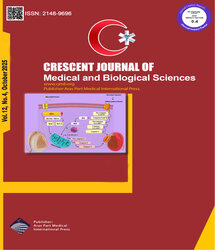| Original Article | |
| Impact of Beta-Cyclodextrin Treatment on Medicinal Constituents and Quality Indices of Nigella sativa Seed Oil | |
| Ziba Abdian1, Sodeif Azadmard-Damirchi1, Mohammadali Torbati2 | |
| 1Department of Food Science and Technology, Faculty of Agriculture, University of Tabriz, Tabriz 51666, Iran 2Department of Food Science and Technology, Faculty of Nutrition, Tabriz University of Medical Sciences, Tabriz 15731, Iran |
|
|
CJMB 2025; 12: 201-207 DOI: 10.34172/cjmb.2025.3900 Viewed : 522 times Downloaded : 579 times. Keywords : Fatty acids, Nigella sativa oil, Physicochemical properties, Quality, Stability |
|
| Full Text(PDF) | Related Articles | |
| Abstract | |
Objectives: Black cumin (Nigella sativa L.) seeds (BS) contain approximately 25%–35% oil, which has widespread applications in the food, pharmaceutical, and cosmetic industries. Compared to other vegetable oils, BS oil tends to have higher acid and peroxide values (PVs), reducing its applications. Different pre-treatments of black cumin seeds were used to enhance the quality of extracted oil, but they were not very effective. Applying adsorbents such as β-cyclodextrin is gaining attention to reduce the impurities from fats and oils. Therefore, the present research aims to examine the impact of using β-cyclodextrin as an adsorbent in the processing of BS oil. Materials and Methods: This study investigates the effects of pretreatment of BS oil with various concentrations (0 (control sample), 2.5, 5, 7.5 and 10%) of β-cyclodextrin dissolved in water: ethanol at ratios of 1:1 or 1:2 (v/v) on thymoquinone, chlorophyll, carotenoids, peroxide value (PV) and acid value (AV), oxidative stability and fatty acids. High-performance liquid chromatography and spectrometry determined thymoquinone content, chlorophyll, and carotenoid amount. PV and AV were measured by titration. Oxidative stability was determined using the Rancimat equipment. Fatty acid composition was also determined by gas chromatography. Results: The results revealed that β-cyclodextrin, up to 5% dissolved in water: ethanol (1:2, v/v), could significantly reduce the PV (16.9 to 10.2 meq O2/kg oil) and AV (4.2 to 2.7 mg KOH/g oil) and increase the oxidative stability (9.8 to 12.7 h). Moreover, β-cyclodextrin could also reduce the bioactive components (thymoquinone and carotenoids). Still, these reductions were smaller when the oil samples were treated with β-cyclodextrin at concentrations below 7.5%. However, pretreatment of BS oil with β-cyclodextrin did not affect the fatty acid composition of the oil samples. Conclusions: Overall, the findings suggest that β-cyclodextrin treatment (up to 5%) can be an effective strategy to enhance the stability of black seed oil, expanding its potential applications in the food, pharmaceutical, and cosmetic industries. |
Cite By, Google Scholar
Online Submission System
 CJMB ENDNOTE ® Style
CJMB ENDNOTE ® Style
 Tutorials
Tutorials
 Publication Charge
Medical and Biological Research Center
About Journal
Publication Charge
Medical and Biological Research Center
About Journal
Aras Part Medical International Press Editor-in-Chief
Arash Khaki
Deputy Editor
Zafer Akan


















